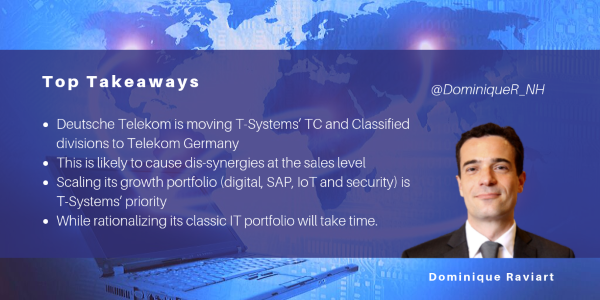Search posts by keywords:
Filter posts by author:
Related Reports
Related NEAT Reports
Other blog posts
posted on Aug 15, 2019 by Dominique Raviart

Deutsche Telekom (DTAG) recently announced it is moving T-Systems’ communication services activities with enterprise clients (TC division) and Government clients (Classified division) to Telekom Germany. Accordingly, T Systems’ TC and Classified divisions will be folded into Telekom Germany’s B2B Communications division that currently services small businesses and mid-sized enterprises in its domestic market.
DTAG posits that the new structure will help it better coordinate activities and eliminate internal charging mechanisms along with simplifying portfolio management, sales, and operations. It will also set up T-Systems’ IoT and security activities as standalone companies, still reporting under T-Systems.
T-Systems’ CEO, Adel Al-Saleh, continues to reshape the company: last year, he introduced a significant thee-year restructuring program, impacting 10k positions (including 6k in Germany), targeting ~€60m in savings, with around half of this to be reinvested in the business, prioritizing digital, security, cloud, SAP, toll collect, and ICT services to the public sector.
We estimate that TC and Classified generated ~ €2.5bn in revenue in 2018, around 35% of T-Systems’ overall revenues. The news of their transfer to Telekom Germany is thus a significant move, and one that has several implications.
Further complexity at the sales level
We expect dis-synergies at the sales level. Telekom Germany’s B2B division and T-Systems will target similar clients in Germany and in international markets. The new structure may simplify the organization of Deutsche Telekom at the delivery level but complicates it at the sales level.
With this new sales organization, DTAG is setting up an organizational structure that differs from those of competitors. Competitors such as BT and Orange target enterprise clients as part of dedicated enterprise units, respectively BT Global Services and Orange Business Services, and it is not clear why this organization with large enterprises serviced in a separate unit does not work at DTAG.
Rationalizing the classic IT portfolio will take time
The new organization leaves T-Systems with an eroding business – ‘classic IT’ – that includes application and IT infrastructure services (including private cloud hosting), and its ‘growth portfolio’, now without Classified. NelsonHall estimates that classic IT represents approximately ~€2.1bn in revenues, while the growth portfolio is a €1.7bn business. T-Systems is acting on divesting parts of its classic IT business.
T-Systems’ classic IT business includes mainframe and desktop services – and recent efforts to divest these activities have been thwarted. The German cartel office has refused permission for IBM’s acquisition of T-Systems’ mainframe services business (400 personnel). IBM had offered to buy the unit for €860m, a significant amount for T-Systems. T-Systems is now back to the discussion table for its mainframe business with another vendor. And German media has reported that T-Systems and Atos could not agree a price for T-Systems’ end-user computing activities.
Scaling the growth portfolio is the priority
Al-Saleh is taking actions to scale the growth portfolio. However, IoT and security, both of which are high-growth potential businesses, are still small units within T-Systems.
IoT and security sit at the intersection of telecom & network services and IT services, with IoT requiring investment in NB and 5G networks and helping to sell M2M SIM cards. Security, with its network security element, is also critical for both DTAG’s telecom and IT service units.
Setting up IoT and security as independent organizations to accelerate their growth and benefit from commercial opportunities from the entire DTGA group thus makes sense.
There remain two significant units within T-Systems’ growth portfolio, Digital Solutions and SAP services (with NelsonHall estimated revenues of ~€0.5bn for each unit).
In 2018, T-Systems grouped its digital unit into a formal unit, Digital Solutions, combining consulting units (mostly Detecon), its web agency (T-Systems Multimedia Solutions) and several systems integration and agile development units. Digital Solutions has a headcount of ~5k and is therefore of significant scale. T-Systems’ challenge with SAP services is to accelerate its portfolio transition to SAP S/4 HANA and new SAP cloud offerings.
The transformation of T-Systems will take time
Al-Saleh has a three-year horizon, with DTAG and T-Systems keen on making T-Systems’ transformation socially acceptable to its personnel and client base. We expect T-Systems to make acquisitions to scale up its Digital Solutions business, provided T-Systems gradually improves its financial performance. The good news is that with the acquisition of Sprint now proceeding, DTAG has, with T-Mobile U.S., a significant profit driver, which should provide some relief.
